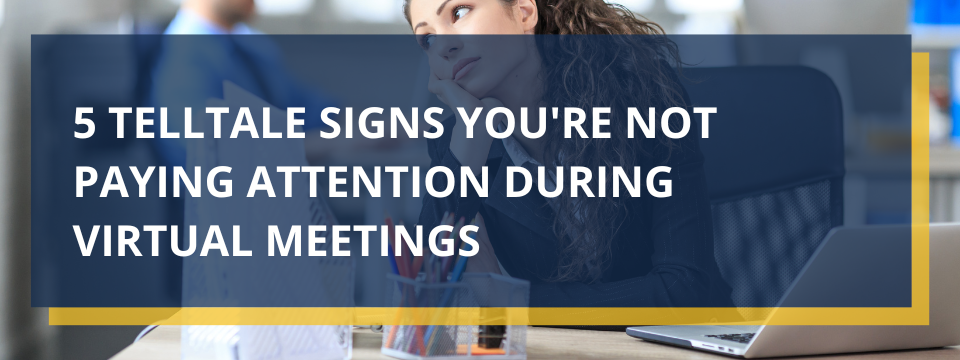
We've all been in virtual meetings where we’re distracted and our minds drift, or we’re juggling 10 things at once. But here's the thing – just because it's common for people to disengage during meetings, it doesn't mean that the behavior is acceptable. Others notice when you're mentally somewhere else during a video call and it doesn’t reflect well on you or your company. If you develop a reputation for conducting yourself this way, you can end up damaging your personal brand and that of your company too.
Think about how you feel when engaged in conversation with someone sitting across from you and that person continuously scrolls their phone as you speak. You likely feel frustrated, annoyed, insulted, ignored – or all the above. The same is true during virtual meetings. Being visibly distracted during a video meeting conveys that your attention is elsewhere, perhaps because something else holds more significance at that moment than the person you're conversing with. The people on the other end will notice – and will not have positive feelings about it.
This behavior can be very costly to business relationships. The last thing you want is for a customer, prospect, investor, colleague, vendor – or really, anyone you meet with – to feel undervalued or assume their time or business isn't your priority. Remember, perception matters.
Not sure how obvious you are with multitasking during virtual meetings? Here are some of the classic giveaways that you're doing something else – and how to avoid falling into the bad habit in the first place.
One of the most obvious indicators of distraction is regular prolonged pauses (or, "Ahhhhh," "Ummmm," etc.) before addressing a question or thought, often with a very brief or vague response. If you consistently take longer on video than in person to chime in (and when you do, you provide a generic remark), it signals that your focus is elsewhere. Stay engaged and active in the discussion so you can respond promptly and offer insightful comments that contribute to the conversation.
Frequent looking away from the camera (particularly turning your head down or off to the side) is a red flag that you’re doing something else (like checking your phone or reading emails on another screen). Maintaining regular eye contact is a basic sign of attentiveness in-person that translates to virtual meetings too. Looking into the camera, especially when speaking or being spoken to, approximates the experience of real eye contact and shows you are actively engaged.
Lack of facial expression and head movement gives the appearance of disinterest in a conversation. Nonverbal cues play a significant role in communication, particularly during virtual meetings when the facial close-up amplifies your expression or lack thereof. Slouching or resting your chin in your hand shows boredom and fatigue, whereas nodding in agreement, smiling and occasional hand gestures show attention and that you’re completely present in the discussion.
Obvious things like looking down at your phone, typing loudly on a keyboard (when it’s not relevant for notetaking) or visibly engaging in non-related work during a meeting show you're not fully invested in the present discussion. Others may take it as insulting, disrespectful behavior. Participate in a meeting as an active listener by focusing solely on the meeting at hand. If you’re easily tempted, close email and other application windows and disable any notifications that may lure your attention away.
A common indicator that you’re not paying attention is when you repeat a question that someone else already asked or restate something already discussed in the meeting. This behavior suggests that you weren't fully listening. Show engagement and understanding by asking relevant, thoughtful questions that build on the conversation.
Recognizing when you’re guilty of any of the common pitfalls in virtual meetings can be a game-changer for your professional interactions by eliminating unintentional disrespect or relationship building blunders. So, whether it's those subtle distractions or more glaring signs, remember them, own them and avoid them next time. Cultivating a personal brand that projects active and undivided attention pays dividends to your professional success. Organizations that prioritize a culture of attentiveness, especially in the virtual sphere, clearly value and foster lasting connections with colleagues, as well as customers, prospects and other stakeholders.
Point Road Group can help you maximize opportunities to connect and communicate effectively with prospects and customers. Contact us to discuss how.